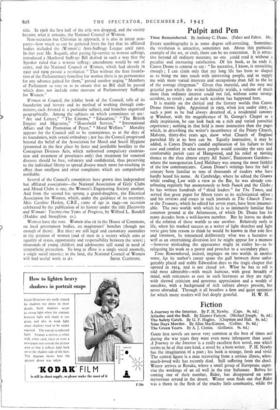Pulpit and Pen
Time Remembered. By Anthony C. Deane. (Faber and Faber. 18s.)
EVERY autobiography is in some degree self-revealing. 'Sometimes the revelation is attractive, sometimes not. About this particular example of the art, or craft, there can be no contention. It is attrac- tive beyond all ordinary measure; no one could read it without a peculiar and increasing satisfaction. Of his book, as he ends it, Canon Deane is content to say: " Its narrative, I know, is unexciting enough ; I can claim only that my long life has been so shaped as to bring me into touch with interesting people, and to supply me with more varied interests and occupations than fall to the lot of the average clergyman." Given that material, and the easy and graceful pen which the writer habitually wields, a volume of much more than ordinary interest could not fail, without some strange accident, to result ; and no such accident has happened here.
It is mainly on the clerical and the literary worlds that Canon Deane throws light. Appointed in 1929, when just under sixty, to such a post as he bad always dreamed of, a residential canonry at Windsor, with the magnificence of St. George's Chapel as a daily inspiration, he can look back on a rich and varied parochial experience ; nothing in that field is more instructive than the pages which, in describing the writer's incumbency of the Priory Church, Malvern, thirty-five years ago, show what Church of England parochial life at its best can be. Equally instructive, it may be added, is Canon Deane's candid explanation of his failure to find ease and comfort in what most people would consider the easy and comfortable parish cure of Hampstead, and his relief at moving thence to the then almost empty All Saints', Ennismore Gardens— where the nonogenarian Lord Halsbury was among the most faithful of the few communicants. Canon Deane's writings have for half a century been familiar to tens of thousands of readers who have hardly heard his name. At Cambridge, where he edited the Granta while reading Law with a view to the Bar, he was already con- tributing regularly but anonymously to both Punch and the Globe ; he has written hundreds of " third leaders " for The Times, and served that great paper for fifteen years as its ecclesiastical editor ; and his reviews and essays in such journals as The Church Times or the Treasury, which he edited for seven years, have been innumer- able. The two worlds with which he is so intimately familiar find common ground at the Athenaeum, of which Dr. Deane has for many decades been a well-known member. But he leaves no doubt of the relation of those worlds to one another. Relatively early in life, when his marked success as a writer of light sketches and light verse gave him reason to think he would be known in that role first and foremost, he renounced deliberately what was a lucrative as well as an entertaining diversion lest he might appear for a moment —however misleading the appearance might in reality be—to be relegating his work as a pastor and preacher to a secondary place.
Time Remembered, indeed, impinges on two worlds in another sense, for its author's career spans the gulf between those unfor- gettably placid and stable Edwardian days to the tragic chapter that opened in 1914, and is not closed yet. What he has to tell is told most admirably—with much humour, with great breadth of mind, with reticences as rare in such literature as they are right, with shrewd criticism and generous appreciation and a wealth of anecdote, with a background of rich culture always present, but never obtruded. Through it all breathes a firm and quiet optimism for which many readers will feel deeply grateful. H. W. H.






























 Previous page
Previous page